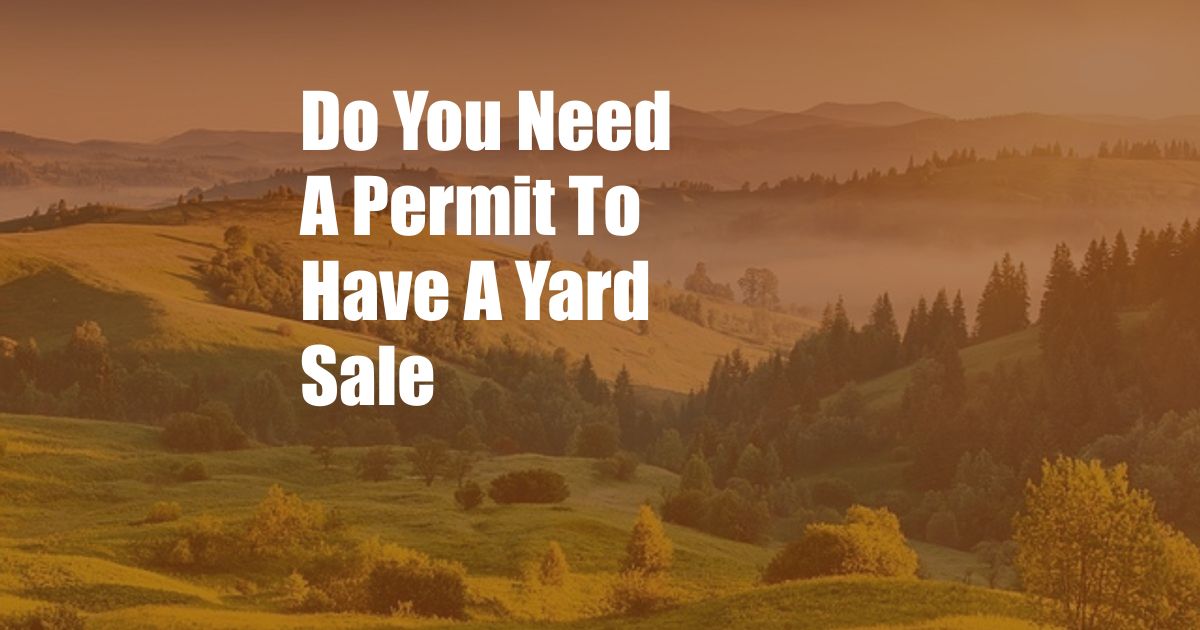
Do You Need a Permit to Have a Yard Sale?
As the weather warms and springtime cleaning fervor takes hold, many of us turn to yard sales as a way to declutter our homes and make a little extra cash. But before you set up shop, it’s important to know if you need a permit. The answer can vary depending on where you live. Let’s dive into the topic and clear up the confusion.
Understanding Yard Sale Regulations
Depending on your local jurisdiction, yard sales may be regulated by city, town, or county ordinances. These ordinances can vary widely, so it’s always best to check with your local authorities to determine if a permit is required. In general, permits are more likely to be required for large-scale or frequent yard sales, such as those held by professional vendors or businesses.
Do I Need a Permit?
To determine if you need a permit, consider the following factors:
- Frequency and Duration: Some localities may require permits for yard sales held more than a certain number of times per year or that last for more than a specified number of days.
- Location: The location of your yard sale can also impact whether a permit is required. For example, yard sales held in public spaces, such as parks or sidewalks, may require a permit.
- Size and Inventory: The size of your yard sale and the type of items you’re selling can also be factors. Larger yard sales with a wide variety of items may require a permit, while smaller sales with personal belongings may not.
Benefits of Obtaining a Permit
While obtaining a permit may seem like an additional hassle, it can offer several benefits:
- Legality and Compliance: Operating a yard sale without a required permit can result in fines or other penalties.
- Protection Against Complaints: A permit can provide you with some protection against complaints from neighbors or other residents who may object to your yard sale.
- Increased Visibility: Some localities may offer promotional support or signage for permitted yard sales, increasing visibility and attracting potential customers.
How to Obtain a Permit
If you determine that a permit is required, contact your local city or town hall to inquire about the application process. The process may vary depending on your location, but generally involves filling out an application form and providing proof of residency and any required fees.
Expert Tips and Advice
- Be Proactive: Check for permit requirements early on to avoid any last-minute surprises.
- Follow the Regulations: Adhere to all regulations regarding the size, location, and duration of your yard sale.
- Be Respectful: Keep your yard sale organized and clean, and be mindful of noise levels and any potential impact on neighbors.
- Consider Insurance: Some localities may require proof of liability insurance for permitted yard sales.
- Get the Word Out: Advertise your yard sale through local newspapers, social media, or online classifieds to attract customers.
Frequently Asked Questions
- How much does a yard sale permit cost? Fees vary by location, but generally range from $10 to $50 or more.
- What information is required on a yard sale permit application? Typically, you’ll need to provide your name, address, contact information, and the dates and location of your sale.
- How long does it take to get a yard sale permit? Processing times can vary, but most permits are issued within a few business days.
- Can I get a permit for a yard sale on a public sidewalk? In many cases, yes, but you may need to obtain a permit from the city or town, as well as permission from the property owner.
Conclusion
Whether or not you need a permit for a yard sale depends on the regulations in your specific location. It’s always advisable to check with your local authorities before setting up your sale to ensure compliance and avoid any potential issues. By following the guidelines and seeking the necessary permits, you can enjoy a successful yard sale that benefits your community while adhering to the law.
Are you interested in the topic of yard sale permits? Share your questions or experiences in the comments below.